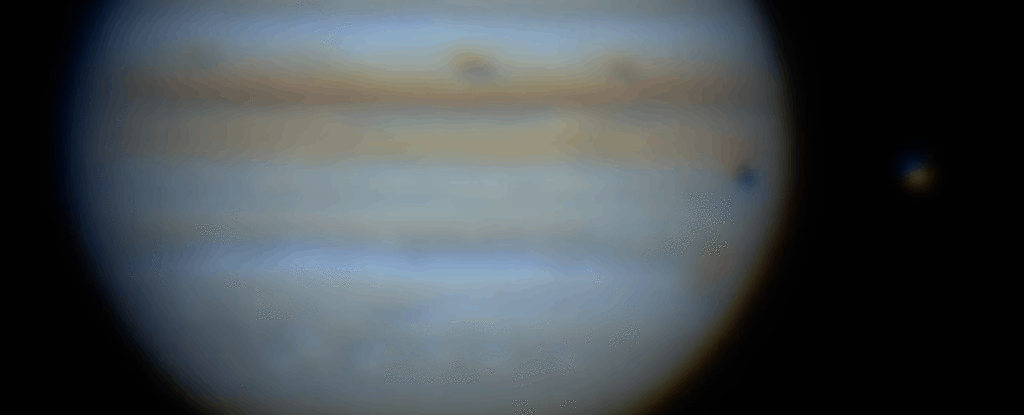
Posted on 09/17/2021 8:02:38 AM PDT by Red Badger
Poor old Jupiter. It's just hanging out there, being a gas giant, shepherding trojans, minding its own business, and boom. Smacked upside by a stray space rock.
That's not necessarily unusual for Jupiter, actually. What is unusual is that someone happens to be looking and filming at just the right time - and this month, that happened, with sky-watchers around the globe catching an explosion in the planet's upper atmosphere.
On 13 September 2021, at 22:39 UT, amateur astronomers recorded the bright flash of what appeared to be a Jupiter impact - namely Harald Paleske from Germany, who was recording the shadow of Io as it passed in front of the planet, and José Luis Pereira from Brazil.
Others included Simone Galelli in Italy, and Jean-Paul Arnould and Michel Jacquesson in France. Thibaut Humbert, Stéphane Barré, Alexis Desmougin and Didier Walliang of the Société Lorraine d'Astronomie in France also managed to film the putative impact.

(SLA astronomie54/YouTube)
If confirmed, the event will only be the eighth impact event observed on Jupiter since the impact of comet Shoemaker-Levy 9 in 1994, which broke apart due to Jupiter's tidal forces, and produced a string of impacts.
These were actually on the planet's far side, but a 2.2-meter telescope in Hawaii photographed the heat signatures of these impact sites as they orbited into view, and Hubble captured the dark smears left behind on the clouds, known as a scar.
It's unknown precisely how often Jupiter gets smacked by something large or fast enough to produce an impact flash visible from Earth, but it's thought to be fairly often - somewhere between 20 and 60 times per year. Jupiter is large and has a huge gravitational field, which accelerates meteorites to generate much more energetic events than we experience on Earth.
But we don't see them as often as they're predicted to occur, for multiple reasons. The most recent capture of an impact event on Jupiter was over two years ago.
"It's a very fleeting event, it's a few seconds," astronomer Jonti Horner from the University of Southern Queensland in Australia told ScienceAlert at the time.
"It wouldn't be so obvious, if you were looking through the eyepiece of the telescope. A lot of the time these things will go unnoticed and unobserved. Half of them will happen on the far side of the planet. So there's a lot of things working against seeing these events."
Light on at Jupiter! Anyone home? This bright impact flash was spotted yesterday on the giant planet by astronomer José Luis Pereira.
Not a lot of info on the impacting object yet but its likely to be large and/or fast!
Thanks Jupiter for taking the hit☄️#PlanetaryDefence pic.twitter.com/XLFzXjW4KQ
— ESA Operations (@esaoperations) September 14, 2021 Nevertheless, the rate at which we detect them seems to be increasing. This will be of great benefit to astronomers hoping to understand Jupiter's role as a cosmic vacuum cleaner protecting Earth from rocks that might have otherwise headed our way.
Some analysis suggests that this may have been exaggerated, but, either way, understanding it more accurately can help us model the chances for life in other planetary systems that have or don't have Jupiter-like gas giants.
The object that smacked Jupiter in 2019 turned out to be an object 12 to 16 meters in diameter (40 to 50 feet), with a mass of about 450 tons and a stony-iron composition.
We're going to have to wait for an in-depth analysis of the flash, and subsequent observations looking for an impact scar, to see what hit Jupiter this time around. But with so much material to work with, we're excited to see what astronomers find.
VIDEO AT LINK..........................
Jupiter throws comets and asteroids towards Earth like a ‘sniper’, scientist warnsYou have to take those Jovians seriously because they are sniping and taking pot-shots at us.
by David Aragorn, January 14, 2020It was once thought that the gas giant Jupiter protected Earth from asteroids and other deadly space objects. But one scientist has warned that the massive planet actually acts as a ‘sniper rather than a shield’. Kevin Grazier, a physicist who used to work at NASA, has published several papers exploring whether Jupiter’s gravity deflects comets and asteroids away from our vulnerable planet. ‘Our simulation suggests that instead of shielding the terrestrial planets, Jupiter was, in fact, taking “pot shots”.
“Our simulations show that Jupiter is just as likely to send comets at Earth as deflect them away, and we’ve seen that in the real solar system.’
I suspect Jupiter absorbs far more than it inflicts damage on Earth but over time we will learn more about what all happens. Even with Jupiter we are vulnerable to whatever decides to land on us.
But I do like that guy's name. A lot.

I wonder if Jupiter has acted like a big brother and prevented a Earth collision?
That is and the other gas giants jobs.............
Well, at least not the kind of dinosaurs which drove SUVs and contributed to global warming 65 million years ago.
It’s too small to be Uranus.
Article written by Michelle Starr, no less....
A Vulcan spaceship?
Yeah. Yeah. That’s cool.
Better them than us.
Next time I’m up there I’ll take a look. Until then, I’m not going to worry about it.
Trump did it.
 Michelle Starr is a Senior Journalist at ScienceAlert; her deep love and curiosity for the cosmos has made the publication a world leader in reporting developments in space research. She is an award-winning journalist with over 15 years of experience in the science and technology sectors. Prior to joining the ScienceAlert team in 2017, she worked for seven years at CNET, where she created the role of Science Editor. Her work has appeared in The Best Australian Science Writing 2018 ans 2020 anthologies, and in 2014, she was awarded the Best Consumer Technology Journalist in the Optus IT Journalism Awards. She absolutely adores orcas, corvids, and octopuses, and would be quite content to welcome any one of them as the new overlords of Earth. Twitter: @riding_red
Michelle Starr is a Senior Journalist at ScienceAlert; her deep love and curiosity for the cosmos has made the publication a world leader in reporting developments in space research. She is an award-winning journalist with over 15 years of experience in the science and technology sectors. Prior to joining the ScienceAlert team in 2017, she worked for seven years at CNET, where she created the role of Science Editor. Her work has appeared in The Best Australian Science Writing 2018 ans 2020 anthologies, and in 2014, she was awarded the Best Consumer Technology Journalist in the Optus IT Journalism Awards. She absolutely adores orcas, corvids, and octopuses, and would be quite content to welcome any one of them as the new overlords of Earth. Twitter: @riding_red

Dark Smears is a great name for a rock band.
When I was a teen, circa 1969-70, there was a local garage band called ‘Dark Entry’. They got their name from a road sign in front of a tunnel....
There was also another local garage band called Lynyrd Skynyrd......................
I didn’t see a hole forming, like when shoemaker-Levy struck the planet.
Maybe it was just some alien tourists snapping photos.
Yup!
“I see you are from the Department of Redundancy Department.”
You mean the Department of Redundant, Redundancy Department?
Disclaimer: Opinions posted on Free Republic are those of the individual posters and do not necessarily represent the opinion of Free Republic or its management. All materials posted herein are protected by copyright law and the exemption for fair use of copyrighted works.